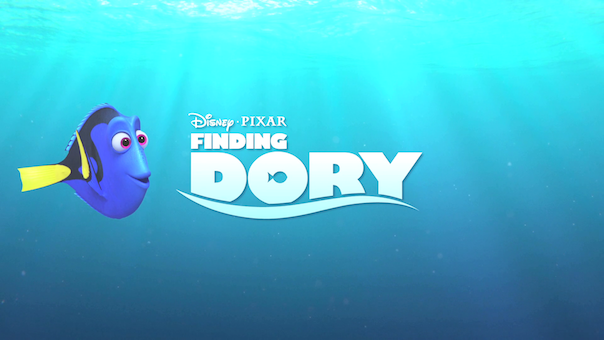The Oscar-winning Finding Nemo passed me by – no kids, no reason, no go. But given the critical acclaim and universal praise it received, as well as my newfound and unashamed interest in animations, I thought I’d dip my toe into the water for its sequel Finding Dory both of which were co-directed and co-written by Andrew Stanton and produced by Pixar. And judging by the raft of glowing reviews and not-to-be-sniffed-at one billion dollars – I repeat, one billion dollars – it has thus far taken at the box office, it’s obvious that families and fans of the franchise have given it a big fins up. Though whether it’s my age, childless status or unfamiliarity with all things Finding, it didn’t make as much of a splash with me as I had thought and hoped it would.
In a nut (or rather clam) shell: the titular Dory, a forgetful blue fish voiced by Ellen DeGeneres, is separated from her doting parents Jenny and Charlie (Diane Keaton and Eugene Levy) after being swept away by a strong undercurrent while out searching for her mother’s beloved purple shells. Despite suffering from amnesia, memories of who she is and where she’s from resurface thanks to a chance meeting with childhood acquaintances Nemo and his father Marlin (Hayden Rolence and Albert Brooks) and an unlikely friendship with Hank (Ed O’Neill), a seven-armed, truck-driving octopus who can change colours faster than Mo Johnston.
From one side of the Pacific Ocean to another they are speedily transported by what I am reliably informed is the correct collective noun for sea turtles – a bale – to the Marine Life Institute in Dory’s home town of “The Jewel of Morro Bay” in California. In short, a fish hospital whose mission a Sigourney Weaver-voiced tour guide tells us is to “rescue, rehabilitate and release”. Having got tangled up in some discarded drinks packaging (don’t splash your trash!), Dory is scooped out of the water by a helping hand and tagged for assessment in a quarantine tank where she risks being sent to Cleveland (which I presume is the American equivalent of Coventry).
But thanks to her never-say-die attitude and back-from-the-dead buddies who like Dory don’t let their disabilities stop them from living happy and fulfilled lives – including the near-sighted shark Destiny and the whale with wonky sonar Bailey (Kaitlin Olson and Ty Burrell) – all’s well that ends well. Or is it? For when Dory emulates Dorothy in The Wizard of Oz and follows a purple-shelled road to there’s no place like home, her mother and father are nowhere to be seen. And what’s worse: a shoal of fellow blue tangs whisper ominously that “they’ve gone”. Gone as in swam away to the big ocean in the sky or gone as in up sticks and left for pasture new? To find out you’ll have to join the queue.
There’s a lot to love and admire in Finding Dory, notably its central theme of “There’s always another way” and “Just keep swimming”. And in a year which has seen so many films about action men with superpowers, it’s refreshing to see a girl (okay, a girl fish) take centre stage who like her seven-armed octopus friend Hank does not let her imperfections stand in her way of navigating life’s choppy waters. But what I would have liked to have seen more of is (to turn one of Elvis’s lyrics on its head): a little more conversation, a little less action please. The rare moments of beauty really drew attention to the small fish in a big pond loneliness of Dory, but the screenwriters could have pushed it a bit further if they had cut back on the number of cat and mouse chases. And the comic one-liners, as featured in the following exchange between Dory and Hank, were sharp but all too fleeting: “Right, follow me,” says Dory. “You’re in a cup,” replies Hank. Beat. “Okay, I’ll follow you.”
[imdb id=tt2277860]
- REVIEW: Orphans @ Edinburgh King’s Theatre
- 13th April 2022
- REVIEW: Everybody’s Talking About Jamie @ Edinburgh Festival Theatre
- 30th March 2022
- REVIEW: Sheila’s Island @ Edinburgh King’s Theatre - 2nd March 2022











